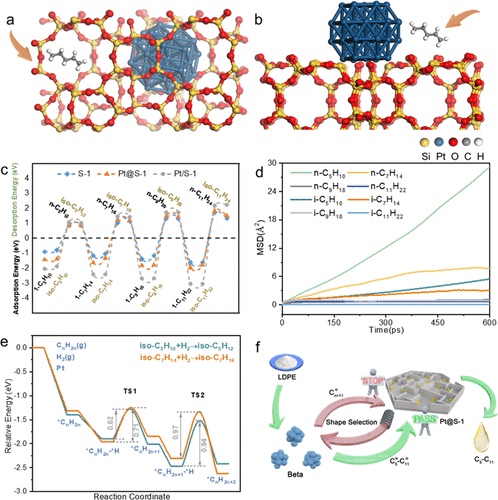Research Progress
The rapid growth of plastic waste is an ever-growing environmental and energy challenge. Selectively converting waste plastics to naphtha, a main feedstock for ethylene and the plastic industry, shows high potential to partially replace petroleum-route naphtha and alleviate global net carbon emissions. However, these active metals on supported catalysts with an open microenvironment showed less effect on the generation of intermediates and selectivity of naphtha.
Motivated by such a challenge, a research group led by Prof. WANG Hui and Associate Prof. LUO Hu at the Shanghai Advanced Research Institute, Chinese Academy of Sciences developed a tandem catalytic reaction to efficiently convert low-density polyethylene (LDPE) into naphtha, where a naphtha yield of 89.5% is obtained with 96.8% selectivity of C5-C9 hydrocarbons at 250 °C, catalyzed by mechanically mixed β zeolite and Pt@S-1 catalysts.
The research results were published in Journal of the American Chemical Society recently.
The selectivity of normal alkanes catalyzed by Pt@S-1 and β zeolite reached 34%, about 10-20% higher than that on Pt/S-1, and the alkane products were narrower. The differences between the two catalysts were possibly due to the confinement effect and shape-selectivity of Pt@S-1. Thus, combined density functional theory (DFT) and molecular dynamics simulations were used to reveal the shape-selectivity process, as the diffusion and shipping of olefin intermediates with the right size were boosted within Pt@S-1, which led to narrower-distributed products.
This catalyst system displayed stability and high performance for most abundant plastic waste like low-/high-density polyethylene and polypropylene at moderate conditions. With life cycle assessment (LCA), this approach showed 15% energy saving and 30% reduced greenhouse gas emissions compared with conventional routes for plastic production.
This work provides an upgrading strategy for retaining the value of waste plastics more efficiently and serving as a significant step to realize the circular economy.

DFT and molecular dynamics calculations (image by SARI)





